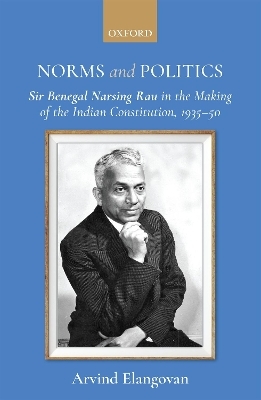
Norms and Politics
Sir Benegal Narsing Rau in the Making of the Indian Constitution, 1935-50
Seiten
2019
OUP India (Verlag)
978-0-19-949144-5 (ISBN)
OUP India (Verlag)
978-0-19-949144-5 (ISBN)
Who was Sir B N Rau and why is it important to remember him in the history of the Indian constitution? This book answers this question by taking us into the years leading to India's independence and the framing of the Indian constitution. In recovering his ideas by revisiting the political context of the day, one understands why he must be remembered and why, unfortunately, he has been forgotten.
At the twilight of the British rule in India, a little known civil servant, Sir Benegal Narsing Rau (1887-1953) was sought after by the ruling elites - both British and Indian, for his immense knowledge of the nature and working of the constitutions of the world as well as his reputation for being just and impartial between competing political interests. Yet, Rau's ideas and his voice have largely been forgotten today. By examining Rau's constitutional ideas and following its trajectory in late colonial Indian politics, this book shows how the process of the making of the Indian constitution was actually never separated from the politics of conflict that dominated this period. This book demonstrates that it is only by foregrounding this political history that we can simultaneously remember Rau's critical contributions as well as understand why he was forgotten in the first place.
At the twilight of the British rule in India, a little known civil servant, Sir Benegal Narsing Rau (1887-1953) was sought after by the ruling elites - both British and Indian, for his immense knowledge of the nature and working of the constitutions of the world as well as his reputation for being just and impartial between competing political interests. Yet, Rau's ideas and his voice have largely been forgotten today. By examining Rau's constitutional ideas and following its trajectory in late colonial Indian politics, this book shows how the process of the making of the Indian constitution was actually never separated from the politics of conflict that dominated this period. This book demonstrates that it is only by foregrounding this political history that we can simultaneously remember Rau's critical contributions as well as understand why he was forgotten in the first place.
Arvind Elangovan teaches history at Wright State University, US. He earned his doctorate from the University of Chicago, US. He has published several articles on the history of the Indian Constitution.
I. INTRODUCTION
II. RAU, PROVINCIAL AUTONOMY, AND ITS (ANTI) COLONIAL LIMITS
III. CONUNDRUM ON THE EVE OF DECOLONIZATION: POLITICS OF CONSTITUTIONALISM, 1945-46
IV. RAU'S CONSTITUTIONAL SOLUTIONS TO THE POLITICAL CONUNDRUM
V. MOMENT OF UTOPIA: RAU AND A CONSTITUTION ABOVE POLITICS
VI. A CIVIL SERVANT'S ADIEU: THE BURDEN OF HISTORY IN THE CONSCIENCE OF THE INDIAN CONSTITUTION, 1946-50
CONCLUSION
BIBLIOGRAPHY
INDEX
ABOUT THE AUTHOR
| Erscheinungsdatum | 16.10.2019 |
|---|---|
| Verlagsort | New Delhi |
| Sprache | englisch |
| Maße | 145 x 218 mm |
| Gewicht | 408 g |
| Themenwelt | Geschichte ► Allgemeine Geschichte ► Zeitgeschichte |
| Geisteswissenschaften ► Geschichte ► Regional- / Ländergeschichte | |
| Sozialwissenschaften ► Politik / Verwaltung ► Staat / Verwaltung | |
| ISBN-10 | 0-19-949144-5 / 0199491445 |
| ISBN-13 | 978-0-19-949144-5 / 9780199491445 |
| Zustand | Neuware |
| Haben Sie eine Frage zum Produkt? |
Mehr entdecken
aus dem Bereich
aus dem Bereich
Gewalt, Umwelt, Identität, Methode
Buch | Softcover (2024)
Spector Books OHG (Verlag)
CHF 49,95
wie Freud im Kollektiv verschwand
Buch | Hardcover (2024)
Klett-Cotta (Verlag)
CHF 34,95


